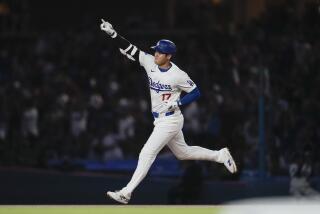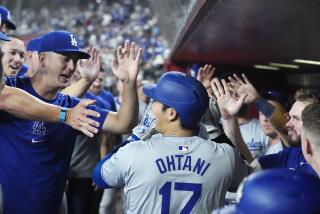NATIONAL LEAGUE CHAMPIONSHIP SERIES : Clark Puts Giants Over Bridge : 8th-Inning Single Keys 3-2 Clincher
- Share via
SAN FRANCISCO — It came down to 62,084 fans on their feet, three San Francisco Giants on the bases, and the Chicago Cubs’ premier relief pitcher, Mitch Williams, glaring down from the mound.
What separates Will Clark from most is that he saw only the baseball.
“I heard nothing, I felt nothing,” the Giants’ first baseman said. “I didn’t know what the fans were doing, I didn’t know what the pitcher was doing. I couldn’t have told you what Mitch’s eyes looked like. I didn’t even know if he was wearing a beard.
“What it was, was just me and the ball.”
One swing later, as the ball bounced through the thick grass of center field, their private meeting became a citywide celebration. Clark’s two-run single up the middle in the eighth inning Monday helped give the Giants an eventual 3-2 victory and their first National League pennant since 1962.
Their triumph over the Cubs in this National League championship series, four games to one, advances them all the way to, well, to the nearest bridge. Beginning Saturday in Oakland, they will take on the American League champion Athletics in the first World Series-turned-Bay Series. Both teams have been in the area since the A’s joined the Giants here in 1968.
Not that anybody in the Giants’ clubhouse Monday would acknowledge that another side of the bay exists in baseball.
“This is Giants’ territory,” Giant owner Bob Lurie proclaimed while wearing the traditional champagne. “After all, we were here first.”
And the memories of their series may last longer, thanks to Monday’s finale, which featured a fitting end to the best performance by a hitter in the 21-year history of the National League playoffs.
The conclusion was set up by a collapse of Cub starter Mike Bielecki’s arm and Cub Manager Don Zimmer’s judgment, which accounted for three two-out walks to load the bases in a 1-1 tie. Clark, who earlier had tripled and scored the Giants’ first run, left the on-deck circle feeling good. So good, in fact, that he decided to brag about it.
According to on-deck hitter Kevin Mitchell, who spoke to Clark just before he stepped to the plate, their conversation went like this:
Mitchell: “You gonna get him?”
Clark: “It’s done.”
And so it was, although he chose the hard way. Clark took a strike, fouled a ball over the backstop, watched a ball, then fouled off two more pitches.
Then came this high, rising fastball.
“It was a good pitch, my best pitch,” Williams said. “I would not take it back, no way.”
Clark said, “I just swung. Next thing I know, I’m standing off first base and then I hear it. All that screaming and cheering.”
He wasn’t just standing, he was strutting, with his arms raised, and black-gloved fists shaking.
Fifteen minutes later, when Chicago’s Ryne Sandberg ended a final Cub rally and the game by grounding out to second baseman Robby Thompson, Clark strutted again.
Ignoring the Giants’ traditional pileup on the mound, he stuck his fists back into the air and walked around first base, alone, perhaps befitting for a man in a class by himself.
“The man did it once, and then once more, and then once again,” Cub outfielder Marvell Wynne said. “The man is unbelievable.”
Wondered Cub Shawon Dunston: “How are you going to stop Mr. Everything?”
The Cubs certainly don’t have a clue, since the NL series’ most valuable player hit .650, collecting three doubles, a triple, two homers and eight RBIs.
He set championship series records for batting average, slugging percentage, 1.200; hits, 13; runs, eight; extra-base hits, six, and total bases, 24.
The New Orleans native also set some sort of mark for high-pitched laughs, such as the one he emitted when asked why he thrives on pressure situations.
“Ah! . . . If guys don’t like these situations, they shouldn’t be in the game,” Clark shouted. “If you don’t want to come up with the bases loaded, you should hang it up. That’s what this game is all about. That’s what life is all about.”
Clark might have noticed that life is also about squirming, which is what the Cubs did in that eighth inning, when their hopes for their first World Series in 44 years ended.
Bielecki started the eighth cruising, having allowed only three hits, including Clark’s seventh-inning triple that was followed by Mitchell’s game-tying sacrifice fly. But Bielecki retired the first two Giants in the eighth and seemed poised to move the game into the ninth.
But then pinch-hitter Candy Maldonado worked Bielecki for 10 pitches, including five foul balls, and finally walked. Then, in another full-count battle, Brett Butler walked, too.
By then, Bielecki had thrown 127 pitches and was struggling to with his curveball.
“You could tell he was tired,” Mitchell said. “He was putting balls in the dirt and everything. I’m surprised they didn’t take him out.”
Said Butler: “I thought he had lost his composure.”
But with Robby Thompson batting, Zimmer trotted out and talked to Bielecki and decided he was fine.
“Just because he walked a man doesn’t mean he was losing something,” said Zimmer, who made several questionable managerial moves in this series. “I asked him how he felt and he said, ‘I’m fine,’ so I said, ‘Let’s go.’ ”
Four nearly-wild pitches later, Bielecki had walked Thompson to load the bases. In came Williams to pitch to Clark . . . and out went the Cubs.
“I thought I had enough . . . but I lost it,” said a frustrated Bielecki, who like many other young Cubs won’t soon forget his first postseason experience. “One out! I just needed to get one more out. And I couldn’t do it. I don’t know what I can say.”
Equal blame for this Cub disaster rests with a man from whom more was expected, Andre Dawson.
In his final four at-bats, he stranded nine runners, losing three duels Monday with Rick Reuschel, the Giants’ starter and winner.
In the first, with runners on first and third, Dawson struck out. In the sixth, with runners on first and third and one out, he flied to right.
Finally, in the eighth inning, Dawson burned his name into Cub lore by bouncing a ball back to Reuschel with runners on first and second and two out--after Reuschel had walked Mark Grace to pitch to him.
“Sure it hurts,” Dawson said. “I’m supposed to be a leader on the club, but I didn’t do what I am paid to do.”
In one eight-inning stint during which he allowed just one unearned run on seven hits, Reuschel may have forever put to rest the belief that this big man can’t pitch in big games. Before Monday’s game, in 20 1/3 postseason innings for three teams, Reuschel had allowed 16 earned runs, leading to a 0-3 record and a 7.08 ERA.
More to Read
Go beyond the scoreboard
Get the latest on L.A.'s teams in the daily Sports Report newsletter.
You may occasionally receive promotional content from the Los Angeles Times.











